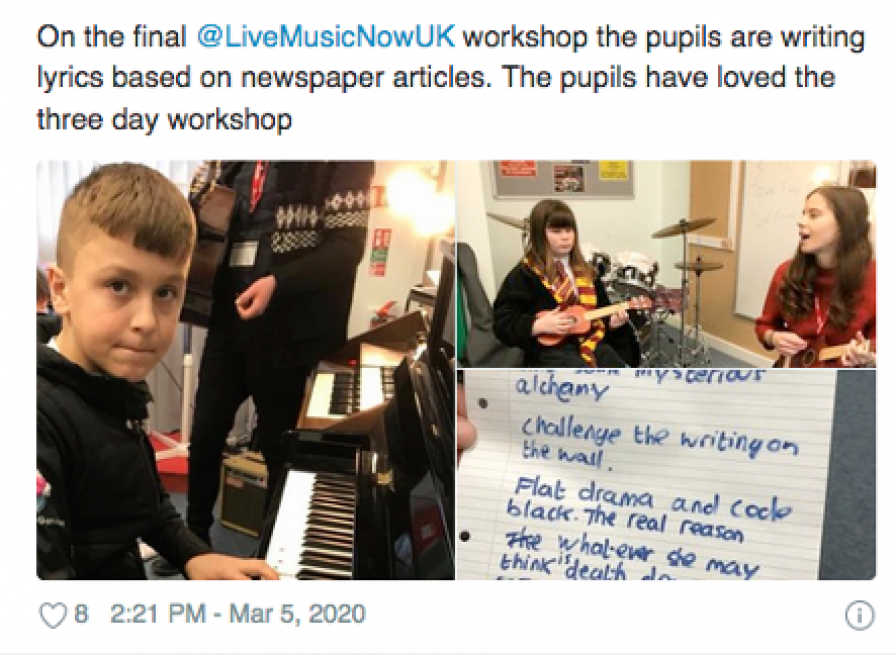Engaging pupils with social, emotional and mental health needs through group music-making

SEND Inspire is Live Music Now’s training programme for early career professional musicians. During 4-6 years with Live Music Now, musicians have the opportunity to undertake “in-situ” training in schools to develop leadership skills for inclusive music-making. Singer-songwriter, Zoe Wren, shares learning from her first “Level 1 project” working in a secondary special school.
As a folk musician and singer-songwriter, community music-making has always been central to my practice, which is why I was so thrilled to become a Live Music Now musician over a year ago. I have been performing at folk clubs and festivals as well as busking on the London Underground for several years, and led singing workshops in local prisons while at university.
Taking part in Live Music Now’s SEND Inspire training in Hull has been one of my most rewarding experiences as a musician, and I am amazed at how much I learned in such a short time.
I spent three days in a school for young people with social, emotional and mental health needs working with lead musician, Simon, to deliver music sessions based around collaborative composing.
We worked with three different age groups each day focusing on song writing. First, we explored rhythms through games, eventually coming up with a group rhythmic ostinato; on the second day we taught pupils some chords and experimented with ordering them to create a chord sequence; and finally we wrote lyrics together, using newspapers as inspiration. I was amazed at what the pupils came up with (there was some serious musical and lyrical talent!). Each group brought different creative strengths and made their song completely their own. Seeing them become so engaged with the music was a real joy. One particular highlight was when two pupils who were arguing over whose turn it was to play the piano were invited to share it instead; almost straight away they began helping each other to practise, until they were playing in time together, in a really meaningful musical interaction.
Given the varying individual needs within the groups, one of the main challenges was finding ways to engage all pupils, but finding solutions made the experience so much more enriching overall. This is what I learnt:
Give sessions a clear focus: having one key aim eg writing lyrics, was helpful so that the pupils knew exactly what they were working towards.
Be Flexible: having a plan is important, but flexibility is vital, as each group and each child will respond differently. The way to do that is to have a varied musical tool kit, which Simon demonstrated with the range of games, interactive activities and musical ideas. No session was the same and we tailored it to each group based on their responses.
Pupil led activities work best: we started our lyric writing as a big group activity, but soon saw that the pupils were becoming disengaged with the ‘teacher standing at the front’ format, so we put everyone in small groups to work on a section each. This was much more effective; once the pupils were more directly involved in the creative decisions they became more enthusiastic about participating.
Involve staff: the teachers and support staff helped us engage the pupils and always had valuable input to offer.
Develop your reflective practice: I learned so much both during the sessions and afterwards in our reflection time, from recognising different musical responses and gaining ideas for differentiated musical activities to communicating with schools and ensuring the teachers’ involvement from the start.
I now feel equipped to plan and deliver similar sessions in other schools and Iook forward to planning and delivering a longer project next.
